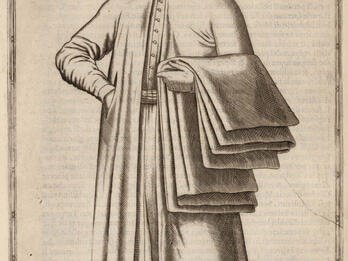Magen Avraham (Shield of Abraham)
On the Topic of Usury and Interest, Which a Jew Is Permitted to Take from Them; and That These Christians Are Not from Edom
When a borrower is asked to pay usury or interest, they frequently use this as a public opportunity to strike the Jew verbally, and to present us as lacking in morals and as stingy with our money: he who loves silver shall not be satisfied with silver (Ecclesiastes 5:9) and the soul will not be filled by such a lowly, despicable occupation [see Ecclesiastes 6:7; 1 Samuel 15:9], which is against law and nature. [ . . . ] When Christian rulers argue that taking usury and interest is a lowly, despicable occupation, which is forbidden to Jews, they cite two reasons for this claim:
It is against nature and proper law, and against civilized society and the political order, as it leads to genuine evils—the destruction of families and the loss of money, in a manner that is not required by nature and wisdom, as determined by the basic political structure which was arranged by the Divine wisdom from the earliest times, before the perfect Torah was given. Back then, when we were all brothers—we are all the sons of one man (Genesis 42:11)—the descendants of the primeval parents, Adam and Eve, nature and wisdom undoubtedly decreed and implanted in us the inclination to band together in groups with love and enduring unity, and to offer each other all types of help and assistance. [ . . . ]
Interest is completely prohibited by all the written laws that have been etched onto stone, old and new alike, especially by the perfect Torah, the Torah of Moses, may he rest in peace, for all her ways are ways of pleasantness (Proverbs 3:17), and it contains nothing twisted or warped; rather, it is the mainstay of them all. This demand is stated in several places: in Exodus, the portion of Mishpatim: you shall not lay interest upon him (Exodus 22:24); and it is stated concerning one’s brother in the portion of Behar, from the book of Leviticus: you shall take no interest or increase from him (Leviticus 25:26). [ . . . ] [A]nd David, may he rest in peace, wrote in absolute terms that it is forbidden to take interest from all people, as he declared: he who does not put out his money on interest which implies from any person in the world. Ezekiel likewise wrote this law unambiguously in many places. Now, we are all today the sons of our forefather Jacob, may he rest in peace, and he was treated as a full-fledged brother by Esau in all the stories of the Torah: For example, it is stated: we came to your brother, to Esau (Genesis 32:7); [and Esau said,] I have enough, brother (Genesis 33:9). For his part, he too called him “brother,” as it is stated: and Moses sent messengers from Kadesh to the king of Edom: thus says your brother Israel (Numbers 20:14); was not Esau Jacob’s brother? (Malachi 1:2). And these are the very people who are called Edom and the sons of Esau, according to the opinion of the Jews themselves that they are in exile in the hands of their brother Esau and Esau is Edom. Consequently, it is absolutely forbidden for a Jew to take usury or interest from them, as we are brothers from both of these sides—from our ancestral parents, Adam and Eve, and also from the side of Patriarchs, as we are the sons of our forefather Isaac, may he rest in peace.
However, I will write down in length the response I formulated against these claims—in accordance with the Torah that the Lord placed in my mouth—in the presence of the ministers and nations during the days of the debate. This is what I have to say to resolve any uncertainty, to clarify and elucidate the basic principles of the matter, as I shall detail below. One who reflects upon my comments will learn enough to resolve his doubt and will certainly understand the issue and conclude that it is permitted for a Jew to take interest from them.
The first principle is that after civilized society was destroyed and nations became distinguished in their opinions and characteristics, and other such differences and variances on both the group and individual levels, each was left by itself to attempt to gather and accumulate as best they could the good things that could be found on this earth, and thereby rebuild the settlement. Thus, a new nature, and a fresh set of obligations and political arrangements developed of their own accord. This was a different moral code than the first, which was to help others whenever they might lack anything. Such a requirement unavoidably lapsed, and the new norm was that one should give nothing free to others, unless they were poor and destitute and one took pity on them, as the wealthy have pity on paupers. However, regarding other levels, when one person needs something that he lacks, of which the other has plenty, and vice-versa, all such exchanges come at a financial cost. [ . . . ]
Furthermore, the non-Jewish nations do not have the authority to say concerning anything which was permitted to us by the Torah and its teachers—by dint of the verse: to a foreigner you may lend upon interest (Deuteronomy 23:21)—that it is prohibited, especially in light of the evident fact, reaffirmed by the intellect, that these Christians are certainly considered “foreigners” in this respect, as we will prove in our discussions of the subsequent principles. This is the precise equivalent of the requirement of Christians that they must listen to their wise men and the great and minor popes, when they decree, permit, or prohibit something based on the first commands issued to Peter the Apostle, their first high priest, who is mentioned in their Gospels as having received the keys to heaven [see Matthew 16:19], and that the statements of their popes must never be doubted—the same applies to Jews with regard to the permission to take interest from Christians, once this has been permitted, and we will bring proofs that it was indeed permitted.
The fifth point is that the word foreigner in this context denotes the opposite of a brother: one who does not observe the covenant of brotherhood, and who does not guard the beliefs of his brother and our Torah, which separates and sets us aside in our principles and faith. [ . . . ]
It is also an absolute certainty that these Christian nations are not descended from Edom.
Translated by
.
Credits
Abraham Farissol, Magen Avraham (Shield of Abraham) (ca. 1520). Reprinted in: David Shmuel Levinger, Likutim me-sefer magen avraham shel Avraham Farisol (Budapest: Khn Mor Vats, 1927/28), pp. 290–292, 294.
Published in: The Posen Library of Jewish Culture and Civilization, vol. 5.




